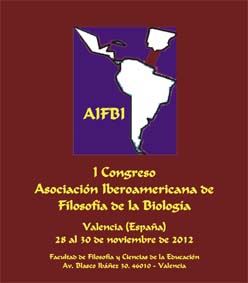
Over one hundred researchers (Spanish and Portuguese speaking) participate from 28 to 30 November at the First Congress of the Latin American Association of Philosophy of Biology, which is taking place at the Faculty of Philosophy and Education Sciences of the University of Valencia. The Full University Professor of Logic and Philosophy of science, José Sanmartín, has inaugurated the meeting with a conference about violent behaviour.
The lecture of José Sanmartín Espluges is titlted Fugint dels extrems. Conciliació (Consilience) per reducció o per sintesí en l’explicació del comportament violent humá.
The scientists will analyze the assumptions and implications of the development and application of biology. This discipline has seen major advances in recent years in areas such as: genetic engineering, molecular biology and ecology, among others. Simultaneously, there is the explicit intention of specialists of bringing together all these areas in a unique association capable of integrating all of them and which also serves as a support for research work. In fact, during these days, the Latin American Association of Philosophy will draw up its foundational basis.
This congress “is the first initiative in which scientists and philosophers of this subject congregate with the intention of unifying their research and dissemination activities, in Portuguese and Spanish language, opposed to the usually overwhelming dominance of English in this and other fields” says the Professor Vicente Claramonte of the University of Valencia, and coordinator together with the Professor Antonio Diéguez of the University of Malaga. “The intention is in time to impulse the scientific excellence of the speciality, contribute to the actualization and improvement of their members and supporters and serve as informative referent in cultural promotion”, adds Diéguez.
The programme consists of eight symposiums coordinated by experts and by eight sections that bring together the communications in the main areas of interest of the philosophy of biology, such as epistemological and methodological aspects, autonomy, complexity and information; biology and society; evolution, cognition and culture; history of biology; philosophical problems of molecular biology, genetics and ecology, among others; philosophical problems in the evolution and development; and origin, definition and classification of life.
The globalization of genetics
Also participates in the congress the Professor Ana Barahona Echeverría of the Autonomous University of Mexico, a leader in Latin America, who is working in a project about globalization of genetics and advised by the evolutionary biologist Richard Lewontin. She also shared seminars and classes with scientific personalities such as the palaeontologist Stephen Jay Gould and the biologist Edward O. Wilson, founder of socio-biology.
The academic conference that will close the event is: The concept of gene in the twenty-first century: what are the open avenues? Of Charbel Xiquet El-Hani, Professor of History, Philosophy and Biology at the Institute of Biology of the Federal University of Badia (UFBA), and researcher at the National Council of Scientific and Technological Development of Brazil. And the Vice-Principal of the University of Valencia, Esteban Morcillo, will chaired the final act, Friday, at 20:00 in the Aula Magna of the Faculty of Philosophy and Education Sciences.
The philosophy of biology belongs to the philosophy of science, includes specific topics such as evolutionary theory, biological determinism, reductionism and genetic vitality or existence of a force or impulse characteristic of living. Also, is closely related with research field such as bioethics, which in its broadest sense comprises the analysis and interpretation of life and its environment and socio-biology that studies biological basis of social behaviour.
Last update: 29 de november de 2012 07:19.
News release



















